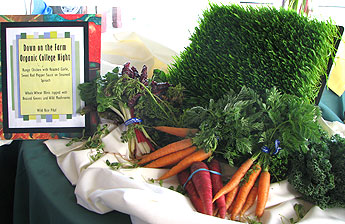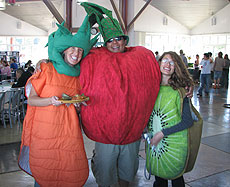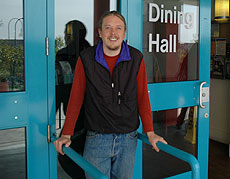
Local organic produce was on display during the recent Organic College Night at College Eight. Photo: Tim Galarneau |
May 8, 2006
UCSC students lead the 'greening' of the university
By Jennifer McNulty
Just as students two decades ago fought apartheid by lobbying the University of California to divest from South Africa, students today are working at all levels to help the university "go green."

Organic College Night organizers used a little theater to help spread the word about the increasing amount of locally grown organic food available in campus dining halls. Photo: Tim Galarneau
|

Tim Galarneau, founding cochair of the UCSC Student Environmental Center, is now part-time coordinator of the UCSC Food Systems Working Group. Photo: Jennifer McNulty |
From energy-saving "green" building designs to organic produce in the dining halls, students have proposed dozens of policies that have been embraced by administrators. Most notably, perhaps, the UC Regents approved the Green Building and Renewable Energy Policy in 2003, which mandates that new buildings outperform state energy-efficiency requirements by at least 20 percent.
UCSC students have been major players in UC's emergence as a leader of the sustainability movement.
"The University of California is on track to be one of the top institutional purchasers of alternative energy in the nation," said Tim Galarneau, founding cochair of the UCSC Student Environmental Center. "Our purchasing power is big enough to push the markets and increase supply."
Galarneau, who graduated in 2005 with a B.A. in psychology and community studies, is now part-time coordinator of the UCSC Food Systems Working Group. He gives UCSC leaders high marks for their receptiveness to student concerns over the years.
"Our approach wasn't to make demands and ultimatums," said Galarneau, noting that UCSC's annual Earth Summit brings together students, faculty, staff, and community members to address a range of issues, including sustainability. He singles out Tom Vani, vice chancellor for Business and Administrative Services, for high praise.
"Students have been so empowered by this work," said Galarneau. "We weren't given the reins, by any means, but we've been able to share our enthusiasm and excitement with administrators. The back-and-forth discussion has been really productive."
Vani calls student sustainability efforts "outstanding" and said he's proud of what students have accomplished.
At UCSC, Galarneau and fellow student organizers Jacob Cabrera and Marcia Winslade founded the Campus Sustainability Council and won student ballot approval for a fee hike to fund campus sustainability initiatives and support the burgeoning multicampus California Student Sustainability Coalition (CSSC).
Systemwide, Matthew St. Clair was hired by the Office of the President two years ago as a "sustainability specialist." At that point, before the CSSC began urging the university to seek renewable energy contracts, none of UC's electricity came from renewable sources. Two years later, 16 percent does, making UC the largest university purchaser of renewable energy in the country. Eighty-five percent was derived from wind and 15 percent was landfill gas, added St. Clair.
"UCSC has a history of energy, water, and resource conservation, and the students have raised the profile of the issues," said Physical Plant director Ilse Kolbus. "They spearheaded the green building policy, and on our campus, they've gone further to look at other systems, including the food system, not just green building and energy conservation."
UCSC already offers myriad alternative-transportation programs, including vanpooling, bicycle shuttles, carpooling, and bus access. Diesel-powered campus shuttles run on a fuel that's 20 percent biodiesel. CSSC member Jonathan Giffard, a junior majoring in environmental studies, is preparing a bicycle plan for campus that identifies new paths, improvements to existing routes, and parking and security enhancements that would make the campus more bike-friendly.
UCSC is also at the forefront of sustainable food initiatives, having adopted guidelines that mandate the purchase of organic, locally grown produce, the recycling of used cooking oil, waste reduction, and more.
Last year, 12 percent of the produce served in campus dining halls was organic, six times the target set for the program's first year. This year, that figure is already 18 percent, with no end in sight, said Galarneau.
With a $4.5 million annual food budget, UC Santa Cruz Dining is bolstering agriculture on the Central Coast. Carol Shennan, director of UCSC's Center for Agroecology & Sustainable Food Systems, helped streamline the process to make it easier for local farms to supply fresh organic produce to campus. Participating farms include Coke Farm, Phil Foster Ranches, Happy Boy Farms, New Natives/Greensward Nurseries, Swanton Berry Farms, and UCSC's own Farm. In addition, UCSC switched from a national food distribution company to a local distributor.
"What Tim and his colleagues have done on food systems is truly a national model," said sustainability specialist St. Clair. "I'm extremely impressed by what they've done."
The sustainability movement has also taken root in classrooms. Five campuses, including UCSC, have integrated sustainability into the course curriculum through the Education for Sustainable Living Project, which offers students academic credit for courses that focus on sustainability.
UCSC's leadership was solidified last spring, when the campus hosted a Sustainability Conference that attracted participants from UC, the California State University system, and state and federal agencies for the largest such gathering in the nation.
Indeed, Vani says UCSC is "an excellent example of how to integrate all the elements of sustainability."
"That's where we're different from the other campuses," said Vani. "We don't just build green buildings or implement a bus rapid transit, or introduce sustainability in the dining halls. We do all of that. We're putting all the pieces together."